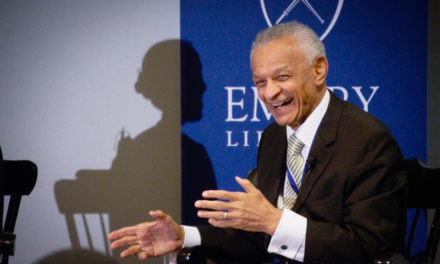The University received the Work-Life Seal of Distinction from the Alliance for Work-Life Progress (AWLP) last Tuesday for the second year in a row. The seal recognizes Emory’s excellence in helping employees juggle career and family life.
Fifty-three other organizations, including the U.S. Dept. of Agriculture, Johnson & Johnson, Yale University and Marriott International, received the honor as well.
The American Heart Association also recognized Emory as a “Fit-Friendly Company” for the fourth consecutive year and as a “Platinum Fit-Friendly” worksite, the highest of the AHA’s “Fit-Friendly” standards, for the third year in a row.
The AWLP is a global brand of the human resources association known as WorldatWork, which boasts a membership of 30,000 in 100 countries, according to the organization’s website. The AWLP branch evaluates applicants based on “evidence of their support in areas spanning dependent care, health and wellness, workplace flexibility, financial support, paid and unpaid time off, community involvement and efforts to transform organizational culture,” according to the organization’s press release.
John Kosky, director of Emory work-life and compensation, has spearheaded the WorkLife Resource Center since 2008. According to Kosky, recent market studies and employee surveys have confirmed Emory’s excellent reputation for employee benefits throughout the industry.
“In terms of work-life comparison to other universities,” he said, “our benchmarking shows that we are among the national leaders in work-life programs and support in academia.”
Some of these programs include the Emory Child Care Network, Finance Matters Workshop series, Back-Up Care Advantage Program, Emory Employee Student Job Network and Caregiver Workshop series.
Tara McCurley, a Woodruff Library service desk coordinator, enjoyed the options Emory Work-Life’s Summer Camp Expo provided for her eight-year-old.
“It was very helpful,” says McCurley, who signed her daughter up for gymnastics camp at the local YMCA. “I don’t have time to research summer camps, and there are so many. But the Expo provides a lot of variety, and it’s all in one place.”
According to this mom and Emory employee, numerous parents working at the University use this and other services for their kids.
Aside from child and elder care, the Work-Life Department’s Hardship Fund gives the voluntary donations of Emory staff to anonymous employee applicants who have suffered a catastrophic event, such as hurricane or fire damage.
“We take one to three applications a month,” says Jessica Perlove, a Woodruff Library specialist who sits on the Hardship Fund Committee. “We review the application, and if you meet the few qualifications, you can receive up to $2000.”
Emory’s Work-Life Center also collaborates with the employee benefits department, according to Theresa Milazzo, associate vice president of Work-Life Resources. “For example,” she says, “[both] organize financial education sessions that feature investment planning experts from our retirement plan vendors.”
Kosky says he continues to look for ways to improve the award-winning center by designing new and effective programs.
“Currently we are working on a comprehensive program to provide work-life support to caregivers of aging adults,” he says, adding that the first phase of the program went live this month and his department has additional enhancements planned for the near future.
– By Lydia O’Neal
The Emory Wheel was founded in 1919 and is currently the only independent, student-run newspaper of Emory University. The Wheel publishes weekly on Wednesdays during the academic year, except during University holidays and scheduled publication intermissions.
The Wheel is financially and editorially independent from the University. All of its content is generated by the Wheel’s more than 100 student staff members and contributing writers, and its printing costs are covered by profits from self-generated advertising sales.





